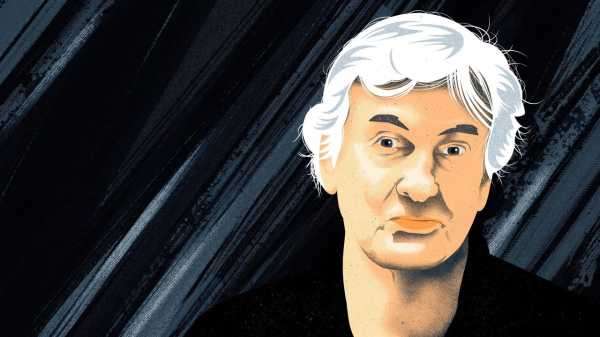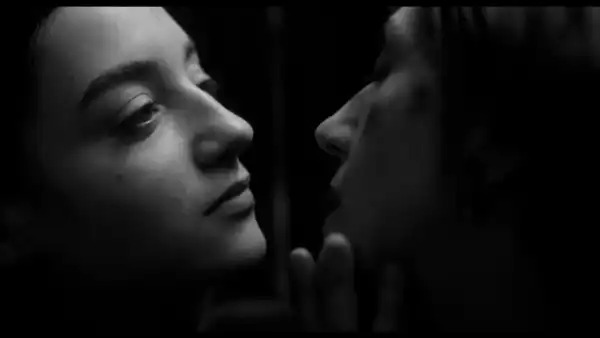
Paul Verhoeven’s breakout movie, “Turkish Delight,” from 1973, is still one of the highest-grossing Dutch films ever made. Nominated for an Academy Award for Best Foreign Language Film, it has all the signatures of a Verhoeven project: love, madness, violence, nudity, and a lot of sex. From his earlier Dutch productions (“Spetters” and “The Fourth Man”) to his Hollywood genre thrillers (“RoboCop,” “Total Recall,” and “Basic Instinct”) to his more recent European art-house films (“Black Book” and “Elle”) what unites Verhoeven’s wide-ranging œuvre is a character-defining sex scene. Now eighty-three, Verhoeven has a new film, “Benedetta,” which is based on an academic monograph about a pair of lesbian nuns in Renaissance Italy, Benedetta and Bartolomea, who have, yes, a lot of sex.
The director’s intellectual commitments have always been robust: he earned an advanced degree in math and physics before turning to filmmaking, and his scholarly pursuits are as eclectic as his body of work. A longtime participant of the Jesus Seminar, a consortium of scholars dedicated to researching the historical Jesus, Verhoeven was the only member who did not have an advanced degree in theology or bible studies. In 2008, he published his own study, titled “Jesus of Nazareth,” which sought “to reduce the stories about Jesus to their human proportions”; he has also been working on a film adaptation of his book. In the meantime, in “Benedetta,” Jesus has to settle for a sexy cameo. Our interview, conducted over Zoom, has been condensed and edited.
How did you approach taking Judith C. Brown’s book “Immodest Acts” to thread a story for your film?
I went from the understanding that the scribe [at Benedetta’s trial] had written down things that had come out of the mouths of Benedetta and Bartolomea. He was sometimes so shocked by the sexuality that Bartolomea brought forward, describing, basically, how many times she “kissed”—by which she meant licked—Benedetta: twenty times! The scribe was so upset sometimes that he made mistakes in his writing and had to cross them out. I thought that the straightness of the testimony of these women was some kind of guarantee—of course, not a hundred per cent—that something like that more or less happened. Fundamentally, there’s some truth to it, and I’ll stick a little bit to these facts. Of course, there are things that we changed.
Did I read correctly that the dildo in the film, which is fashioned out of a statue of the Virgin Mary, was a fictional aspect of the trial?
No, there was no dildo there. But in the book of Judith Brown there are a couple of pages about dildos. We wanted the end [of the movie to be] like Jeanne d’Arc or Marie Antoinette: she would be going to the stake. That was what we felt was necessary to make an end to the narrative—or our narrative, not the reality. At that time, in 1625, you would be burned at the stake if you would—I’ll read it here: “If [a woman] introduces some wooden or glass instrument into the belly of another [woman], she should be put to death.” That was the rule. So we needed it, in fact, to bring her to the stake.
You needed the dildo. I saw a really surprising statistic the other day, which is that, for 2020 and 2021, as tagged on IMDb.com, only a tiny percentage of all feature films released in the last two years contain any sex scenes.
There is already—for twenty years—certainly a movement toward Puritanism. And the question that is asked is “Why would you show a sex scene?,” isn’t it?
Or: What happened to the mainstream Hollywood sex scene? Where did it go?
Well, you have to look at not only Hollywood but life itself. I’m here in the Hague, which is close to the beach. In the seventies, ninety per cent of the women on the beach had no bra. That was the norm—you would have taken that off. If you now go to the beach, there is nobody anymore who has no bra. They have all the bras. That is an enormous switch. . . . [Nudity and sexuality] has not only disappeared in Hollywood movies; it has disappeared in general. There is a fear of sexuality and the portrayal of sexuality, though we are well aware that without sexuality there would not be a species.
I must say, working in France, on “Benedetta,” there was no problem with nudity in any way. But I remember that when I was a child of seven, when we often went to Paris on the holidays, my father took me to the Folies-Bergère, and there were basically twenty to thirty naked women, at least the breasts were all naked. That was, from a Dutch point of view, pretty amazing. But in Paris it was the norm. And these were big shows! They were not some underground thing, and they’re still there.
You didn’t have intimacy coördinators for “Benedetta.”
I didn’t even know at that time that such a thing existed in the United States. For me, these coördinators should be the two women. Of course, it was [discussed] before we started shooting. All the scenes were storyboarded, and all the storyboards were given to the actors so that they knew exactly what it was about, and if they would have problems they could change it. It was completely choreographed. When we were doing “Basic Instinct,” I did the same thing. I gave the storyboards to Michael Douglas and Sharon Stone and Jeanne Tripplehorn. They discussed it and pointed out some stuff where they felt that the angles should be a bit different or a bit closer. We shot it all as a choreography. The big sex scene between Sharon Stone and Michael Douglas took us three days, but everybody knew what was going to happen.
In “Benedetta,” I found the sex scenes to be so dramatically motivated. They’re so stressful, because you don’t know who’s watching; you’re stressed out for them, because it’s such an outsized sin or crime at that time. I’m worried for them in those scenes. How do you think about filming sex in a dramatically stressful way?
I must say, in the case of “Benedetta,” I realized how to do the sex scenes when Daphné Patakia auditioned for the part of Bartolomea. She played her scene so light and in such a pleasant way that I thought, Oh, that’s the way we’re going to do this movie—that it should be lighthearted, it should be a bit funny, it should be as playful as possible, and it should not be too deep.
She has a very childlike, mischievous energy. “Benedetta” is part of a canon of eroticized nuns, from Diderot’s “The Nun” to a film like “Black Narcissus.”
I never thought about nuns in my life, honestly. In Holland, they are not very visible. It was more about how people at that time looked at lesbianism—that was what interested me. How did the church, how did society—in this case, a religious society—look at lesbianism? One theory was that a woman would never be looking at another woman and would always go after the wonderful man. One way of looking at it. And another was following the Apostle Paul: that a woman with a woman is horrifying and nearly satanic. Christianity has not been very open-minded to sexuality, thanks to Paul.
At that time, it was so very normal that a young woman would go to a convent. Of course, the parents had to pay less to a convent than to a bridegroom. For a lot of families with multiple females, it was cheaper to send them to the monastery to make them a nun than to give them to a man.
You’re a scholar of the historical Jesus, you wrote a book about him, and you’ve been studying—I don’t know if you’re still at the Jesus Seminar, but I know that you joined in 1986.
No, not anymore. But the idea to make a movie about Jesus is still there. I’ve made many tries to get a really good outline, and I have a feeling that I am on the way to solve how it should be done. But my Jesus is a little different from, let’s say, the Jesus of the Gospels.
I saw some resonances in “Benedetta,” especially with the insurrectionist ending, with Benedetta as Jesus’ proxy, producing a kind of fictionalized revolutionary moment. The Jesus in “Benedetta” is the least realistic figure, right? The visions—
It’s her vision, isn’t it? I felt that I should be honest to her vision. That is why our Jesus, when he’s on the cross, has not any genitals. That comes from a book on Hildegard of Bingen, who was an abbess in a monastery in Germany in the eleven-hundreds. She wrote and painted and made music—when nuns are singing in the church in the movie, that is mostly music from Hildegard of Bingen. In her paintings of Jesus hanging on the cross, he has no genitals. It was like she didn’t even really know what was there. So I copied that for Benedetta. Her visions would not be my visions, and they would be restrained by what she had seen in her life.
My Jesus is much more revolutionary. When the Romans crucified Jesus, they were convinced that he was an insurrectionist. The political perspective on Jesus in my book is really different from the Gospels. I think that Jesus was much closer to militancy.
I hope you get to adapt your own book.
I’m a little more confident these last couple of months, because I have the feeling that I should be not inventing stories, but look at the stories that are already there and explain and film them in a different way than the Gospels have been done.
You’ve said that Hitchcock is one of your favorite filmmakers. I see a lot of similarities in your work, especially around violence and sex, and love and madness, and a shared idea of women and gender. They’re women who are morally ambiguous. They’re not feminist icons, but they’re powerful and radical. Tell me about your relationship to Hitchcock and his influence.
Well, for a long time in my life, “Vertigo” was my favorite. But, in the last couple of years, I’m more inclined to put as No. 1 “North by Northwest.” The famous scene, the plane that is trying to kill him—of course, if you think about it, what I would have done is take a gun and drive by him and shoot him! Instead of doing that plane. But the scene is so well done that you accept it. What I admire so much about Hitchcock is that he is able to seduce you and push reality to the side. [He convinces you] that this is all true. I think of the lightness of Cary Grant in the movie. And the fact that Eva Marie Saint is fully promiscuous, isn’t she? She has an affair with James Mason, and she is in the train with Cary Grant. He had to maneuver [because of] censorship, of course, but you don’t even notice. My scriptwriter Ed Neumeier, who did “RoboCop” with Michael Miner and also “Starship Troopers”—we’re working on a Washington thriller, and what we feel is that it should have the lightness of “North by Northwest.”
Is it true that you forfeited seventy per cent of your directing fee on “Showgirls” to insure complete creative control to film it as an NC-17 movie?
I did what? What did I do?
You forfeited seventy per cent of your fee on “Showgirls” for creative control.
I gave that away?
For creative control, yes.
No, that’s nonsense. I didn’t ask for a high salary, because we had just gone through a difficult situation with the producers of “Crusade” [a never-made clash-of-civilizations action epic that was intended to star Arnold Schwarzenegger, who worked with Verhoeven on 1990’s “Total Recall”]. Mario Kassar [a producer on “Total Recall” and “Basic Instinct”] had already lost ten million dollars or more, so I felt that I should not, in this case, ask for too much money.
Was there any point in your filmmaking career where you felt like you no longer had to make compromises—that you could make films exactly the way you wanted to?
I have learned that trying to do only what you really want to do is deadly. You have to accept, a little bit, that film is not only art; it’s art and economy. If you have more delicate themes, like in “Elle” or “Benedetta,” you have to diminish your budget, because you will never get the money back if it’s more of an art movie. This is a medium that is very expensive, and of course people want to give you money, but they hope that they get it back, and sometimes they hope that they get much more. It’s not that you compromise, and you should not compromise on the project; you should only compromise on the possibility of the project.
More New Yorker Conversations
- Rick Steves says hold on to your travel dreams.
- Carmelo Anthony still feels like he is proving himself.
- Katie Strang on how the sports media covers sexual abuse.
- Representative Joaquin Castro on the exclusion of Latinos from American media and history books.
- Moe Tkacik on the fight to rein in delivery apps.
- Christine Baranski knows that it is good to be scared.
- Sign up for our newsletter and never miss another New Yorker Interview.
Sourse: newyorker.com






